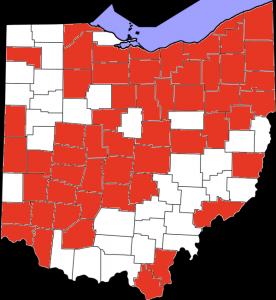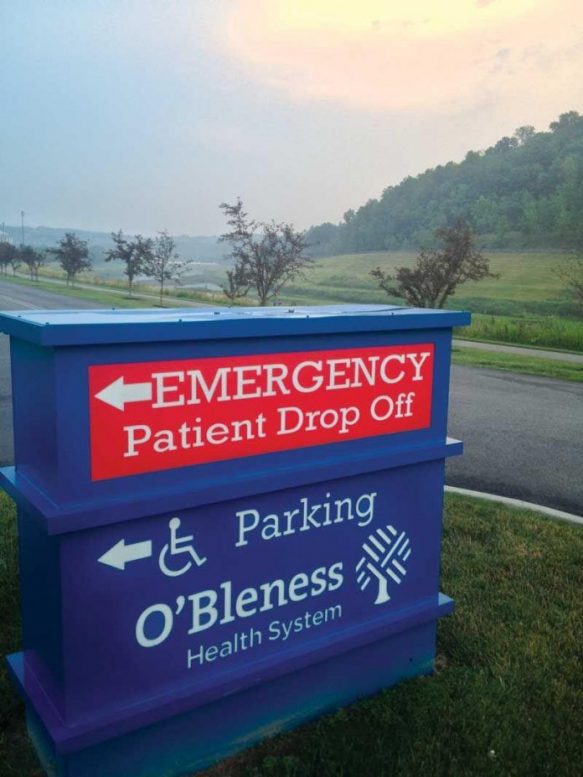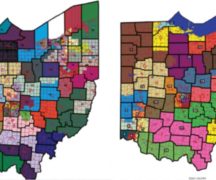By Susan Tebben
Coronavirus has made its way to almost all of Ohio’s 88 counties, but the number of confirmed cases, and the testing it takes to confirm cases, is taking the longest to reach the Appalachian region of Ohio, namely the Southeastern portion of the state.

of coronavirus as of March 25.
On March 25, a majority of Ohio counties had at least one confirmed case of COVID-19: 55 out of 88, or 62.5%. And yet, only 13 out of the 32 counties recognized as Appalachian by the Appalachian Regional Commission’s federal-state partnership had a confirmed case, or about 40%. Many of these were located together in the Northeast corner of the state.
By April 6, nearly every county (81 out of 88) had a confirmed case. But six of the seven counties without one as of that date are located in Southeast Ohio: Hocking, Vinton, Jackson, Meigs, Noble and Harrison.
Dr. James Gaskell, Health Commissioner of the Athens County Health Department, said testing was difficult to obtain, but with OhioHeath and LabCorp now conducting tests, “it’s easily available.”
“OhioHealth has opened a testing site away from the hospital, and anyone presenting symptoms can call their doctor, who will order it,” Gaskell said, adding that the testing sites have not hit capacity of 150 tests.

Gaskell said the surge will hit Athens the same as any other county, but the county is more prepared with more testing and a hospital with an increased bed capacity, from 50 to 120.
“I think we’ll see jumps in the number of confirmed cases in the next few weeks,” Gaskell said.
Meigs County has yet to report any cases, though Meigs County Commissioner Randy Smith told the Capital Journal that the Holzer Clinic in the county has the ability to conduct the tests, and has deployed a tent to allow for less access to the emergency room in cases of potential coronavirus.
The Meigs County Health Department released a statement last week to address concerns from county citizens about the lack of reporting of any cases, negative or positive. Ohio Department of Health director Dr. Amy Acton has said the state will only release the number of confirmed cases at the state level.
In Meigs, the health department said they “truly don’t know how many tests have been run, not the accurate number of negative cases, because according to guidance from the Ohio Department of Health, the Health Department does not have to be notified of every test completed,” according to the statement.
“With our geographical location, people travel to multiple locations for medical treatment, not only in Ohio, but also across the river in West Virginia, which makes the tracking of testing even harder,” the department statement read.
Despite the lack of tests currently, health department officials believe coronavirus “is in the county, but individuals are not seeking testing, but are rather staying at home and waiting it out, just as they would for a cold or a flu.”
Tyler Buchanan contributed to this report.
***
More from Ohio Capital Journal:
Ohio AG appeal denied in abortion health order fight
A district court denied the Ohio Attorney General’s Office appeal against a temporary restraining order allowing abortion clinics to continue surgical abortions during the coronavirus pandemic.
In a decision filed Monday, the U.S. District Court for the Sixth District said the state did not give a sufficient argument to reverse the temporary restraining order, currently in effect for two weeks.
In the denial, the judge calls abortion “a unique medical procedure under both Ohio and federal law because that procedure must be performed within 22 weeks.” READ MORE
Judge rejects voter rights groups’ lawsuit to postpone Ohio primary further
Ohio voters have until later this month to mail in their absentee ballots. They must first apply to their county board of elections office in order to receive their ballot before mailing in the completed vote. The Capital Journal published a full explainer about the process, available here.
The primary election was originally scheduled for March 17, but voting was postponed when the state ordered the closure of all voting locations due to public health concerns. The state legislature determined a solution with the passage of House Bill 197, which called for an extension of voting through mail-in ballots through April 28. There will be no in-person voting except in certain cases, such as a voter having a disability. READ MORE





